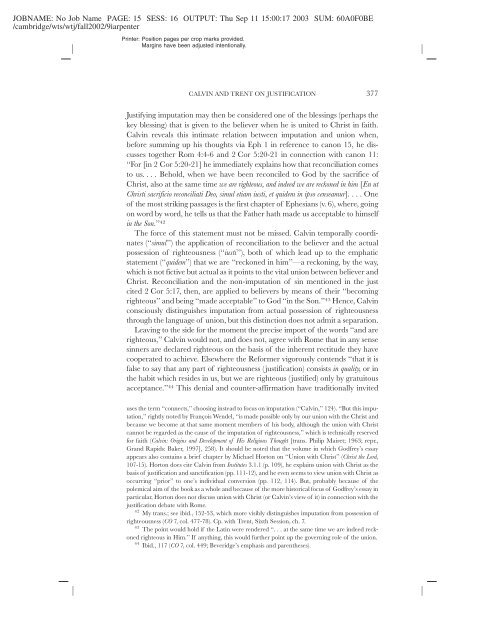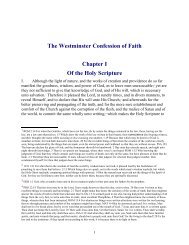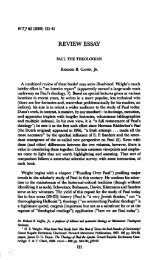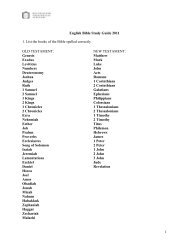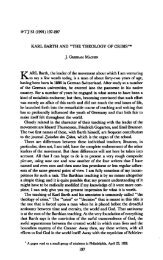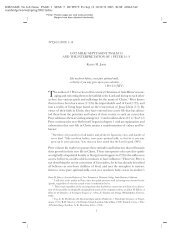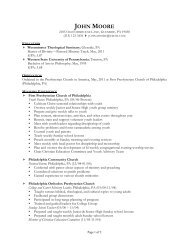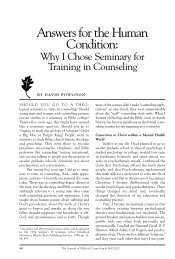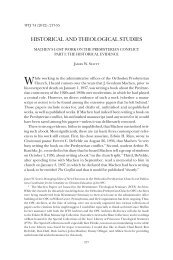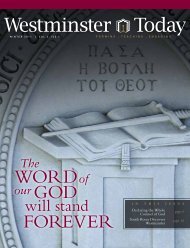A Question of Union with Christ? Calvin and Trent on Justification
A Question of Union with Christ? Calvin and Trent on Justification
A Question of Union with Christ? Calvin and Trent on Justification
You also want an ePaper? Increase the reach of your titles
YUMPU automatically turns print PDFs into web optimized ePapers that Google loves.
JOBNAME: No Job Name PAGE: 15 SESS: 16 OUTPUT: Thu Sep 11 15:00:17 2003 SUM: 60A0F0BE<br />
/cambridge/wts/wtj/fall2002/9ìarpenter<br />
Printer: Positi<strong>on</strong> pages per crop marks provided.<br />
Margins have been adjusted intenti<strong>on</strong>ally.<br />
CALVIN AND TRENT ON JUSTIFICATION 377<br />
Justifying imputati<strong>on</strong> may then be c<strong>on</strong>sidered <strong>on</strong>e <str<strong>on</strong>g>of</str<strong>on</strong>g> the blessings (perhaps the<br />
key blessing) that is given to the believer when he is united to <str<strong>on</strong>g>Christ</str<strong>on</strong>g> in faith.<br />
<str<strong>on</strong>g>Calvin</str<strong>on</strong>g> reveals this intimate relati<strong>on</strong> between imputati<strong>on</strong> <str<strong>on</strong>g>and</str<strong>on</strong>g> uni<strong>on</strong> when,<br />
before summing up his thoughts via Eph 1 in reference to can<strong>on</strong> 15, he discusses<br />
together Rom 4:4-6 <str<strong>on</strong>g>and</str<strong>on</strong>g> 2 Cor 5:20-21 in c<strong>on</strong>necti<strong>on</strong> <str<strong>on</strong>g>with</str<strong>on</strong>g> can<strong>on</strong> 11:<br />
‘‘For [in 2 Cor 5:20-21] he immediately explains how that rec<strong>on</strong>ciliati<strong>on</strong> comes<br />
tous....Behold, when we have been rec<strong>on</strong>ciled to God by the sacrifice <str<strong>on</strong>g>of</str<strong>on</strong>g><br />
<str<strong>on</strong>g>Christ</str<strong>on</strong>g>, also at the same time we are righteous, <str<strong>on</strong>g>and</str<strong>on</strong>g> indeed we are reck<strong>on</strong>ed in him [En ut<br />
<str<strong>on</strong>g>Christ</str<strong>on</strong>g>i sacrificio rec<strong>on</strong>ciliati Deo, simul etiam iusti, et quidem in ipso censeamur]....One<br />
<str<strong>on</strong>g>of</str<strong>on</strong>g> the most striking passages is the first chapter <str<strong>on</strong>g>of</str<strong>on</strong>g> Ephesians (v. 6), where, going<br />
<strong>on</strong> word by word, he tells us that the Father hath made us acceptable to himself<br />
in the S<strong>on</strong>.’’ 42<br />
The force <str<strong>on</strong>g>of</str<strong>on</strong>g> this statement must not be missed. <str<strong>on</strong>g>Calvin</str<strong>on</strong>g> temporally coordinates<br />
(‘‘simul’’) the applicati<strong>on</strong> <str<strong>on</strong>g>of</str<strong>on</strong>g> rec<strong>on</strong>ciliati<strong>on</strong> to the believer <str<strong>on</strong>g>and</str<strong>on</strong>g> the actual<br />
possessi<strong>on</strong> <str<strong>on</strong>g>of</str<strong>on</strong>g> righteousness (‘‘iusti’’), both <str<strong>on</strong>g>of</str<strong>on</strong>g> which lead up to the emphatic<br />
statement (‘‘quidem’’) thatweare‘‘reck<strong>on</strong>ed in him’’—a reck<strong>on</strong>ing, by the way,<br />
which is not fictive but actual as it points to the vital uni<strong>on</strong> between believer <str<strong>on</strong>g>and</str<strong>on</strong>g><br />
<str<strong>on</strong>g>Christ</str<strong>on</strong>g>. Rec<strong>on</strong>ciliati<strong>on</strong> <str<strong>on</strong>g>and</str<strong>on</strong>g> the n<strong>on</strong>-imputati<strong>on</strong> <str<strong>on</strong>g>of</str<strong>on</strong>g> sin menti<strong>on</strong>ed in the just<br />
cited 2 Cor 5:17, then, are applied to believers by means <str<strong>on</strong>g>of</str<strong>on</strong>g> their ‘‘becoming<br />
righteous’’ <str<strong>on</strong>g>and</str<strong>on</strong>g> being ‘‘made acceptable’’ to God ‘‘in the S<strong>on</strong>.’’ 43 Hence, <str<strong>on</strong>g>Calvin</str<strong>on</strong>g><br />
c<strong>on</strong>sciously distinguishes imputati<strong>on</strong> from actual possessi<strong>on</strong> <str<strong>on</strong>g>of</str<strong>on</strong>g> righteousness<br />
through the language <str<strong>on</strong>g>of</str<strong>on</strong>g> uni<strong>on</strong>, but this distincti<strong>on</strong> does not admit a separati<strong>on</strong>.<br />
Leaving to the side for the moment the precise import <str<strong>on</strong>g>of</str<strong>on</strong>g> the words ‘‘<str<strong>on</strong>g>and</str<strong>on</strong>g> are<br />
righteous,’’ <str<strong>on</strong>g>Calvin</str<strong>on</strong>g> would not, <str<strong>on</strong>g>and</str<strong>on</strong>g> does not, agree <str<strong>on</strong>g>with</str<strong>on</strong>g> Rome that in any sense<br />
sinners are declared righteous <strong>on</strong> the basis <str<strong>on</strong>g>of</str<strong>on</strong>g> the inherent rectitude they have<br />
cooperated to achieve. Elsewhere the Reformer vigorously c<strong>on</strong>tends ‘‘thatitis<br />
false to say that any part <str<strong>on</strong>g>of</str<strong>on</strong>g> righteousness (justificati<strong>on</strong>) c<strong>on</strong>sists in quality, or in<br />
the habit which resides in us, but we are righteous (justified) <strong>on</strong>ly by gratuitous<br />
acceptance.’’ 44 This denial <str<strong>on</strong>g>and</str<strong>on</strong>g> counter-affirmati<strong>on</strong> have traditi<strong>on</strong>ally invited<br />
uses the term ‘‘c<strong>on</strong>nects,’’ choosing instead to focus <strong>on</strong> imputati<strong>on</strong> (‘‘<str<strong>on</strong>g>Calvin</str<strong>on</strong>g>,’’ 124). ‘‘But this imputati<strong>on</strong>,’’<br />
rightly noted by François Wendel, ‘‘is made possible <strong>on</strong>ly by our uni<strong>on</strong> <str<strong>on</strong>g>with</str<strong>on</strong>g> the <str<strong>on</strong>g>Christ</str<strong>on</strong>g> <str<strong>on</strong>g>and</str<strong>on</strong>g><br />
because we become at that same moment members <str<strong>on</strong>g>of</str<strong>on</strong>g> his body, although the uni<strong>on</strong> <str<strong>on</strong>g>with</str<strong>on</strong>g> <str<strong>on</strong>g>Christ</str<strong>on</strong>g><br />
cannot be regarded as the cause <str<strong>on</strong>g>of</str<strong>on</strong>g> the imputati<strong>on</strong> <str<strong>on</strong>g>of</str<strong>on</strong>g> righteousness,’’ which is technically reserved<br />
for faith (<str<strong>on</strong>g>Calvin</str<strong>on</strong>g>: Origins <str<strong>on</strong>g>and</str<strong>on</strong>g> Development <str<strong>on</strong>g>of</str<strong>on</strong>g> His Religious Thought [trans. Philip Mairet; 1963; repr.,<br />
Gr<str<strong>on</strong>g>and</str<strong>on</strong>g> Rapids: Baker, 1997], 258). It should be noted that the volume in which Godfrey’s essay<br />
appears also c<strong>on</strong>tains a brief chapter by Michael Hort<strong>on</strong> <strong>on</strong> ‘‘<str<strong>on</strong>g>Uni<strong>on</strong></str<strong>on</strong>g> <str<strong>on</strong>g>with</str<strong>on</strong>g> <str<strong>on</strong>g>Christ</str<strong>on</strong>g>’’ (<str<strong>on</strong>g>Christ</str<strong>on</strong>g> the Lord,<br />
107-15). Hort<strong>on</strong> does cite <str<strong>on</strong>g>Calvin</str<strong>on</strong>g> from Institutes 3.1.1 (p. 109), he explains uni<strong>on</strong> <str<strong>on</strong>g>with</str<strong>on</strong>g> <str<strong>on</strong>g>Christ</str<strong>on</strong>g> as the<br />
basis <str<strong>on</strong>g>of</str<strong>on</strong>g> justificati<strong>on</strong> <str<strong>on</strong>g>and</str<strong>on</strong>g> sanctificati<strong>on</strong> (pp. 111-12), <str<strong>on</strong>g>and</str<strong>on</strong>g> he even seems to view uni<strong>on</strong> <str<strong>on</strong>g>with</str<strong>on</strong>g> <str<strong>on</strong>g>Christ</str<strong>on</strong>g> as<br />
occurring ‘‘prior’’ to <strong>on</strong>e’s individual c<strong>on</strong>versi<strong>on</strong> (pp. 112, 114). But, probably because <str<strong>on</strong>g>of</str<strong>on</strong>g> the<br />
polemical aim <str<strong>on</strong>g>of</str<strong>on</strong>g> the book as a whole <str<strong>on</strong>g>and</str<strong>on</strong>g> because <str<strong>on</strong>g>of</str<strong>on</strong>g> the more historical focus <str<strong>on</strong>g>of</str<strong>on</strong>g> Godfrey’s essay in<br />
particular, Hort<strong>on</strong> does not discuss uni<strong>on</strong> <str<strong>on</strong>g>with</str<strong>on</strong>g> <str<strong>on</strong>g>Christ</str<strong>on</strong>g> (or <str<strong>on</strong>g>Calvin</str<strong>on</strong>g>’s view <str<strong>on</strong>g>of</str<strong>on</strong>g> it) in c<strong>on</strong>necti<strong>on</strong> <str<strong>on</strong>g>with</str<strong>on</strong>g> the<br />
justificati<strong>on</strong> debate <str<strong>on</strong>g>with</str<strong>on</strong>g> Rome.<br />
42 My trans.; see ibid., 152-53, which more visibly distinguishes imputati<strong>on</strong> from possessi<strong>on</strong> <str<strong>on</strong>g>of</str<strong>on</strong>g><br />
righteousness (CO 7, col. 477-78). Cp. <str<strong>on</strong>g>with</str<strong>on</strong>g> <str<strong>on</strong>g>Trent</str<strong>on</strong>g>, Sixth Sessi<strong>on</strong>, ch. 7.<br />
43 The point would hold if the Latin were rendered ‘‘. . . at the same time we are indeed reck<strong>on</strong>ed<br />
righteous in Him.’’ If anything, this would further point up the governing role <str<strong>on</strong>g>of</str<strong>on</strong>g> the uni<strong>on</strong>.<br />
44 Ibid., 117 (CO 7, col. 449; Beveridge’s emphasis <str<strong>on</strong>g>and</str<strong>on</strong>g> parentheses).


